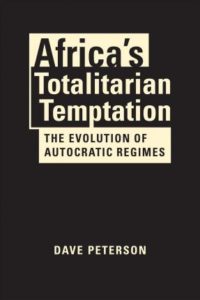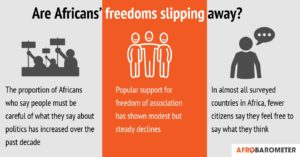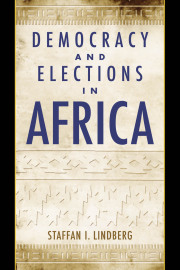Sudan’s transition promises to be anything but easy. Economic problems that sparked initial protests in 2018 still await complex solutions, and the state bureaucracy remains weak. How will the military and the clergy, both important players in Sudanese politics of the past, interact with democratic aspirations for the future? Afrobarometer asks.
We find that as of mid-2018, Sudanese were widely supportive of democracy and the rule of law, and were growing increasingly critical of the extent of their own democracy. Most saw elections as the best way to choose their leaders and supported limiting their president to a maximum of two terms. They increasingly valued government accountability over efficiency, and a growing majority supported media freedom.
Idi Amin feeding his opponents to crocodiles, Jean-Bedel Bokassa crowning himself emperor, Mobutu Sese Seko building a replica of Versailles in the Zaïrian jungle – Africa’s most vicious and predatory dictators have cast a long shadow over contemporary representations of the continent, note analysts Jonathan Fisher and Nic Cheeseman. In reality, of course, managing an authoritarian state is a difficult job. In our new book, Authoritarian Africa: Repression, Resistance, and the Power of Ideas, we show that authoritarian leaders need to be smart and adaptable in order to survive, they write for South Africa’s Mail and Guardian:
The importance of co-optation and the power of ideas to the success of authoritarian leaders does not mean that citizens become happy to live under authoritarian rule. None of the political systems we have described would have survived without repression, and surveys consistently find that strong majorities favor democratic government in almost every country. Moreover, recent political transformations in authoritarian countries from Sudan to Ethiopia and from Burkina Faso to Gambia have demonstrated that African citizens are quick to topple authoritarian leaders when they see an opportunity to do so.
It is still important, however, to understand that the amount of repression a leader requires will be lower if they can co-opt support while managing public sentiment, add Fisher and Cheeseman, respectively, a visiting fellow at the Institute for Advanced Study at Stellenbosch University, and Professor of Democracy at the University of Birmingham and the author or editor of ten books, including Democracy in Africa (2015). RTWT
 Is totalitarianism emerging as an acceptable alternative to democracy in Africa? And if so, with what consequences? Dave Peterson asks in a “lucidly written and cogently argued” new book.
Is totalitarianism emerging as an acceptable alternative to democracy in Africa? And if so, with what consequences? Dave Peterson asks in a “lucidly written and cogently argued” new book.
Disappointment with the ability of democracy to deliver economic rewards in much of Africa—and with the persistence of instability, corruption, and poor governance in democratic regimes—has undermined democracy’s appeal for many on the continent, notes Peterson, senior director of the Africa Program at the National Endowment for Democracy.
At the same time, many external actors express sympathy for regimes that have demonstrated an ability to impose stability and deliver economic growth, despite the limits placed on citizens’ freedom, he writes in Africa’s Totalitarian Temptation: The Evolution of Autocratic Regimes. In this context, Peterson draws on extensive research in country-based case studies across the continent to explore the dilemma of the totalitarian temptation.
In this new era, Africa poses a set of questions that the rest of the world is also asking and must answer, Peterson contends:
Is there a moral equivalency, a trade-off? Is the new totalitarian model superior to democracy, more effective in delivering good governance, promoting economic growth, and maintaining peace? Is it, or should it be, Africa’s future? And is democracy by contrast inherently flawed in the African context, incapable of providing sustainable development, rooting out corruption, suppressing ethnic conflict, or establishing order? Is democracy just a foreign ideology masking the plunder of resources, installing favored leaders, fronting for an international agenda antithetical to African interests?

Afrobarometer
Most Africans support democratic elections as the best way to choose their leaders – if they see their previous elections as free and fair, and especially if those elections produced a change in leadership, according to recent Afrobarometer survey data.
Popular support for elections is driven by the perceived freedom and fairness of the balloting process, and the strongest evidence of a free and fair election is a change in ruling party, Afrobarometer reports in the seventh of its Pan-Africa Profiles series based on public-opinion surveys in 34 African countries.
“Simply stated, Africans support elections to the extent that these contests are seen to bring about desired political change,” the analysis concludes.
 Africa’s experience demonstrates that democratizing nations learn to become democratic through repeated democratic behavior, even if elections are often flawed, political scientist Staffan I. Lindberg argued in Democracy and Elections in Africa. Drawing on data from every nationally contested election in Africa from 1989 to 2003, covering 232 elections in 44 countries, he refutes several nostrums of received wisdom, finding no negative trend in either the frequency or the quality of African elections. The inception of multiparty elections tends to initiate liberalization, and repeated electoral activity creates incentives for political actors, fostering democratic values. In addition to improving the democratic quality of a regime, a sequence of elections tends to expand and solidify de facto civil liberties in society.
Africa’s experience demonstrates that democratizing nations learn to become democratic through repeated democratic behavior, even if elections are often flawed, political scientist Staffan I. Lindberg argued in Democracy and Elections in Africa. Drawing on data from every nationally contested election in Africa from 1989 to 2003, covering 232 elections in 44 countries, he refutes several nostrums of received wisdom, finding no negative trend in either the frequency or the quality of African elections. The inception of multiparty elections tends to initiate liberalization, and repeated electoral activity creates incentives for political actors, fostering democratic values. In addition to improving the democratic quality of a regime, a sequence of elections tends to expand and solidify de facto civil liberties in society.








